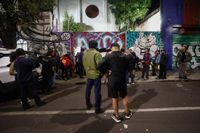On the evening of May 30, 2025, a concert by Basque musician Fermín Muguruza at the iconic Multiforo Cultural Alicia in Mexico City was abruptly suspended in a dramatic and controversial operation involving the Army, National Guard, capital police, and personnel from the Cuauhtémoc City Hall. The event, which had been underway for nearly 40 minutes, was surrounded by armed forces who ordered the immediate cessation of the show and the evacuation of attendees. What followed was a cascade of indignation, confusion, and political fallout that has shaken Mexico City's cultural community and raised serious questions about the use of military force in civilian spaces.
Multiforo Cultural Alicia, affectionately known as "El Alicia," has been a bastion of counterculture in Mexico City since its founding in 1995 by Ignacio Pineda. Located originally in Colonia Roma, the venue has long served as a refuge for alternative artistic expression, hosting genres ranging from ska, punk, and hip-hop to rockabilly, surf, blues, metal, and electronic music. It has been a launching pad for legendary Mexican bands such as Panteón Rococó, Austin TV, Caifanes, Celso Piña, and Molotov, as well as a stage for international artists like Manu Chao. More than just a concert hall, Alicia has functioned as a multifaceted cultural center, offering workshops, conferences, tattoo fairs, documentary screenings, poetry readings, and book presentations. It also founded the independent record label Grabaxiones Alicia, championing a self-managed and rebellious artistic vision. Its commitment to social causes, notably the Zapatista Army of National Liberation, has made it a symbol of political and cultural resistance, often targeted by authorities through closures and sanctions.
Despite facing numerous challenges over the decades—including fines, the COVID-19 pandemic, and competition from large promoters—El Alicia reopened in February 2024 in Colonia Santa María la Ribera with an official cultural license, thanks to the support of Mexico City's government under then-Head of Government Claudia Sheinbaum and the Law of Independent Cultural Spaces.
However, the May 30 operation cast a shadow over this hard-won status. According to eyewitnesses and the forum's founder Ignacio Pineda, the police and military presence was excessive and provocative. Pineda described the action as "an act of provocation. They wanted arrests, they wanted violence." He recounted how police arrived accompanied by media outlets such as Televisa, El Sol, and La Prensa, seemingly aiming to create alarmist news coverage. Pineda suggested that the order to intervene did not come from the city government and speculated that the operation might have been politically motivated, given that elections were scheduled for the following day, June 1, 2025.
The sequence of events began around 5 p.m. when an inspector from the Cuauhtémoc City Hall appeared at the venue, questioning the event's permits and mentioning the absence of a Civil Protection work plan for the day. Shortly afterward, a police chief from the Santa María de la Ribera sector also visited, expressing disapproval of the concert. Despite presenting their cultural license, the forum was warned about potential closure. The concert by Muguruza, which started around 6:50 p.m., proceeded until a convoy of National Guard, police, and Army units arrived, encircling the building and ordering no one to enter or exit.
Ignacio Pineda negotiated with authorities to prevent them from entering the venue, fearing a violent reaction from the audience. He then took the stage alongside Fermín Muguruza to inform the crowd about the presence of approximately 200 armed personnel outside and the need for a calm evacuation. The audience complied peacefully, leaving without incident, though with evident confusion and frustration.
Attendee Vicente García confirmed that the venue was not overcrowded, disproving authorities' claims of overcapacity. He described the atmosphere as festive but calm, with no signs of excessive excitement or violence. A police officer on site cited a lack of permits and heightened strictness due to a recent incident involving intoxicated minors at another party. However, the officer denied that the operation was ordered by the City Hall and mentioned a "unified command" that allowed the deployment of the National Guard and police. This force reportedly moved to Foro Alicia after a prior operation at Bellas Artes, where feminist collectives clashed with street vendors.
Notably, no official documentation, orders, or justifications were provided to the forum's management. This absence has fueled accusations of an unlawful and politically charged intervention. The desalojo sparked widespread condemnation from artists, cultural collectives, and government officials alike.
Saúl Hernández, the lead singer of Caifanes, voiced his outrage during a concert at the Auditorio Nacional on the same night, declaring: "They cannot attack freedom of expression and artistic freedom, they cannot just arrive and raid... whoever ordered the closure of Foro Alicia, go to hell! For our spaces and Mexico City, we will continue protecting these places. Support your bands and your spaces, people." Similarly, Fermín Muguruza took to social media to denounce the use of armed forces to cancel the concert, warning, "The army with long weapons to cancel a concert? Cuauhtémoc City Hall in CDMX: Alessandra Rojo de la Vega of PRI-PAN. Did you want a massacre? Thank you, my people of CDMX! They did not fall into provocation. Long live the people! Long live Mexico!"
In response to the backlash, Mexico City's Head of Government Clara Brugada described the operation as "disproportionate" and confirmed that two commanders from the Secretariat of Citizen Security were removed from their positions pending ongoing investigations. She clarified that the officers acted without orders from their superiors, reportedly reacting to a neighbor's complaint about a crowd outside the venue. Brugada emphasized, "Culture is not to be touched; it is to be defended, supported, and invested in. In my administration, culture is fundamental." She assured that the Foro Alicia remains operational and urged continued support for independent cultural spaces, concluding, "We will not allow censorship or repression, especially not against culture. If there are excesses, there will be consequences."
Ana Francis López Bayghen Patiño, Mexico City's Secretary of Culture, confirmed ongoing communication with the forum's managers and plans to coordinate with security forces to review operational protocols. She also revealed efforts to reschedule Muguruza's interrupted concert in a public, free venue, highlighting the city's commitment to preserving cultural expression.
The Federal Ministry of Interior, responsible for the National Guard, issued a statement condemning the operation as "unjustifiable" and announced investigations to determine who authorized the military and police presence. The ministry pledged to collaborate with Mexico City authorities to clarify the chain of command behind the intervention.
The mayor of Cuauhtémoc, Alessandra Rojo de la Vega, disclaimed any involvement of her administration in the operation, despite evidence of prior visits by her officials to the venue. This further complicated the narrative, with multiple authorities distancing themselves from responsibility.
Despite the turmoil, the Multiforo Alicia continued its cultural mission. On the evening of May 31, 2025, the venue hosted a fusion of classical, ethnic, jazz, and blues music, demonstrating resilience and the community's determination to keep the space alive. Bands such as La Maldita Vecindad, Panteón Rococó, Cabezas de Cera, and Nana Pancha expressed solidarity with the forum, recognizing it as more than a venue — a space of resistance, culture, struggle, and freedom.
The events surrounding the May 30 desalojo have ignited a vital conversation about the role of independent cultural spaces in Mexico, the appropriate use of force by authorities, and the protection of artistic freedom. As investigations proceed and accountability is sought, the story of El Alicia stands as a testament to the enduring spirit of Mexico City's alternative cultural scene and the ongoing battle to safeguard it from repression.


